Text









digital offering for Lady Aphrodite <3!
i got so many things for her lately. some fresh roses, honey, stuff to put on her altar, stickers with shells, to put everywhere and think about her all the time!
i feel like she's the goddess that's been reaching out to me since i was a kid. even since I can remember, I've always loved love. whether it came in romcoms, stories, books, songs, other people, I love love. valentine's day is my favorite holiday since forever, whenever someone offers to get me something, the first thing I always ask is "does it come in pink?" (my family doesn't even ask anymore, they already know to get it in pink), I've always been calling my aesthetic as love core, because if something is pink, red, heart shaped, or glittery, why would I get it in another variant? my whole highschool knew me as the one with heart shaped sunglasses on her head at all times!
so here I am now, a Lady Aphrodite devotee, wearing a sweater with heart print, with heart shaped earrings in my ears. The roses I got her are in a heart shaped vase, next to the glittery, pink bowl with rose quartz and shells inside.
There was a time that I thought it was something bad. Come on, that's so childish. But no, it's fine. Because Lady Aphrodite is teaching me that I can be obsessed with love. Love is such a great phenomenon that it is worth to obsessing about, and I'd like to thank her, for taking me out of this dark place, when just for a second I thought that I should change this about me. Be shut off, love is a weakness, because all that love has brought me, was violence, but no. I won't let ugly things make me ugly. I won't let hard things change me into a person I'm not. I love love, and I'll always love it.
And now, when I'm finally getting colour back into my face, I couldn't be more grateful to have her on my journey. As I'm crawling back to what have always felt like home to me - love. Because it's not something to be ashamed of anymore, and I've never felt better about being the way I am, than now. With Lady Aphrodite on my side.
119 notes
·
View notes
Text
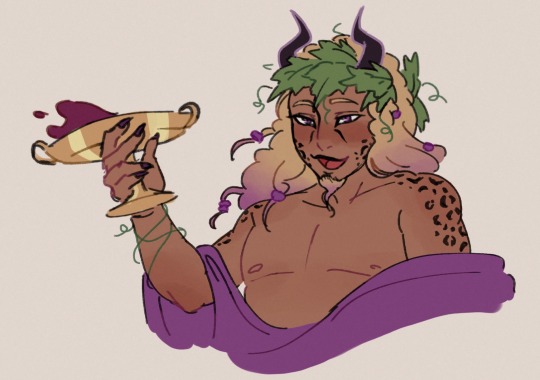
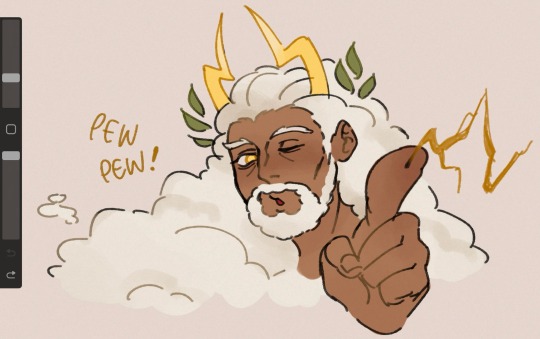
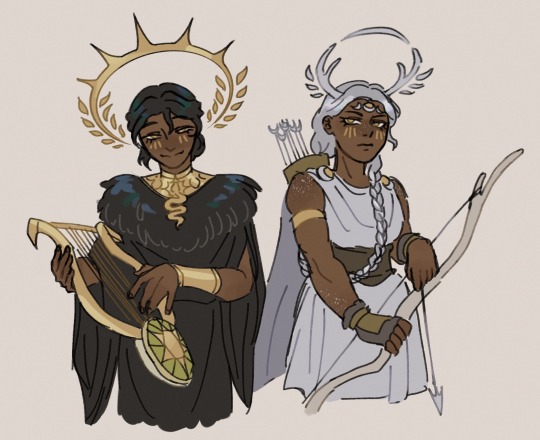
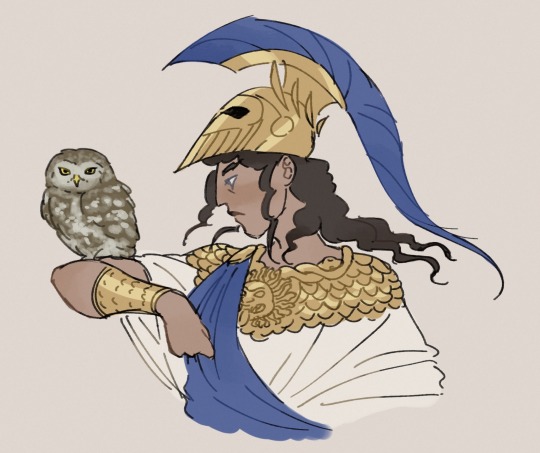
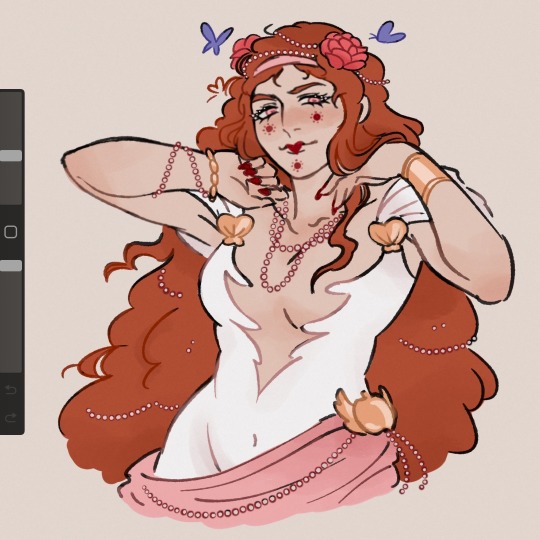
some of the god designs i did over on instagram
925 notes
·
View notes
Text
7 Virtues of Hellenism.
Xenia - This is the pillar that signifies hospitality, generosity and reciprocity. It's typically demonstrated in a guest/host dynamic.
Kharis - This is the pillar that signifies appreciation and gratitude. It entails giving to the gods and and expressing gratitude when you receive something from them.
Eusebia - This is the pillar that signifies reverence and veneration towards the gods. It can be translated to 'piety' or 'reverant conduct' meaning that you show respect for them.
Hagneia - This is the pillar that signifies purifying yourself. It entails having moral, perhaps physical too, purity and avoiding miasma where possible.
Arete - This is the pillar that signifies excellence and brilliance. It entails trying to reach your highest potential and this can be in any field.
Sophia - This is the pillar that signifies the pursuit of knowledge and wisdom.
Sophrosyne - This is the pillar that signifies self-control and prudence. It involves being of sound mind and remaining balanced, which can further lead to other positive qualities to have.
I hope these are right and that I didn't misunderstand their meanings! Hopefully this is useful to anyone, I certainly enjoyed making the post!
3K notes
·
View notes
Text
While checking around for my “Roman gods are not Greek gods” posts, I found back this tripartition of mythology, which is actually a fact that everybody should kno about if they want to dabble in Greco-Roman myths (especially Greek myths).
We know that, during Antiquity, the Romans and the Greeks thought that there wasn’t just one, but three different types of “theology” - three different views, perceptions and reception of the gods.
The first theology was the theology of the priests and of the state - aka, religion. The Greek gods as perceived and described by religion, as honored through rituals and festivals.
The second theology is the “mythic theology” - what we call “mythology today”. It is a set of legends, folktales and stories that are not part of religion, but rather used and carried by art - it is the gods are seen, perceived and described by the poets, by the epics, by the theater plays.
The third theology is the theology of the philosophers - who used the gods and their tales as images and allegories for various abstract or concrete topics. It is the gods as depictions and description of natural phenomenon, or the myths as a way to actualy exemplify a social fact or explain psychological workings.
For the classic Greeks and Romans, there was a clear divide between those three very different point of view of the gods. It was basically three different versions of the pantheon. This is notably why you will find texts noting that priests disliked and condemned the poets’ mythological works, due to them being blasphemous and making the gods too human when religion described them as perfect ; and it is also why the philosophers of old dissed on and rejected the literary works of mythology as nonsense only good to feed superstitions, because for them the gods weren’t characters or realities, but rather abstract concepts and rhetorical allegories.
This is something I feel needs to be reminded, because today these three different theologies have been mixed up into one big mess - as literary myths are placed one the same level as philosophical “myths” (actually texts taking the shape of myths), and both considered of outmost religious importance. When in fact, things were quite different…
EDIT: I was asked if there was a myth that could illustrate the three different theologies, and on the spot I would say “the affair between Aphrodite and Ares”.
This story originates from the “mythological theology”. It is primarily a story, and a good one. It is the story of a husband who discovers his wife is unfaithful and tries to get revenge, it is the story of an extra-marital affair gone wrong, it is typical set of divine shenanigans ending on a grotesque display of divine humiliation - it is an excellent narrative material for plays and poems (and the legend does originates from poems).
The story was also dearly beloved and reused by the “philosophical theology”, because the philosophers adored the idea of the love between Ares and Aphrodite - for them it was the perfect depiction of how the concepts of “love” and “war” , despite being seemingly opposite, attracted each other and were closely tied. For them, this story isn’t to be taken literaly as “a god cheated on another god”, but rather as “this is an allegory showing that love and war are two sides of the same coin, which is why Aphrodite falls for Ares despite being married to Hephaistos”. But for them the whole net part is just poetic nonsense invented to make people laugh ; or maybe they will reinvent them as a moral, cautionary tale that should be used to warn people of the dangers of unfaithfulness.
And then there’s the “religious theology”, the point of view of the priests - for whom such a story is mockery and sacrilege. You can imagine them saying: “You are making the gods look like fools! Gods don’t cheat on each other, gods don’t get captured in nets while butt-naked, gods don’t even sleep on beds - GODS DO NOT EVEN HAVE HUMAN FORMS IN THEIR NATURAL STATE - what the heck is this bullshit you’re saying, you’re just insulting the gods by turning them into lecherous humans and grotesque clowns for your vulgar story!” (This is a reconstitution and not the actual words of an Ancient Greek priest)
627 notes
·
View notes
Text
12 notes
·
View notes
Text

im gonna swap to a different frame next time i go to the shops bc this one fits weird but aaaaaaaaaaaaaa my hestia print from @noctivague finally got here!!!!!!!!! gonna put this up in my entryway :D
66 notes
·
View notes
Text
Pagan/Heathen/General Polytheist question: How do you feel that war deities, or deities associated with war, battle, and combat, for into modern Polytheist religions?
395 notes
·
View notes
Text

A morning prayer poem
to the goddess Aphrodite
in Latin
with English translation
and a list of affirmations.
Ave, divina
Aphrodite,
Amor et pulchritudo maxima,
Quae cunctas terras et maria regis,
Te mane invoco, te adoro.
O dea formosissima,
Quae in cordibus hominum habitat,
Da mihi pulchritudinem intus
et in exterius,
Ut splendorem tuum reflectam.
Per tuae gratiae potentiam,
Coniungo animam meam cum amore
et harmonia,
Ut mihi concedas verum amorem
in vita mea,
Et ut pacem et felicitatem semper teneam.
In tua praesentia,
O divina Venus,
Laetus et confidenter exsisto,
Meae vocis suavitatem dona,
Ut cunctos qui me audiunt afficiam.
O Aphrodite,
domina amoris,
Audi meam precatio matutinam,
Et benevolentiam tuam mihi impertire,
Ut omnes dies mei pleni sint dilectione
et gratia.
Amen.
English Translation:
Hail, divine Aphrodite,
Greatest of love and beauty,
Who reigns over all lands and seas,
I invoke you in the morning,
I adore you.
Oh most beautiful goddess,
Who dwells within the hearts of men,
Grant me beauty inside and out,
That I may reflect your radiance.
Through the power of your grace,
I unite my soul with love and harmony,
Grant me true love in my life,
And may I always hold peace
and happiness.
In your presence,
O divine Venus,
I exist joyfully and confidently,
Grant the sweetness of my voice,
That I may touch all who hear me.
O Aphrodite,
mistress of love,
Hear my morning prayer,
And bestow your benevolence upon me,
That all my days may be filled with love
and grace.
Amen.
Affirmations:
I am beautiful both inside and out.
Love flows abundantly in my life.
I attract and experience true love and happiness.
I radiate love and kindness to all those around me.
I am confident and worthy of love.
I am open to receiving and giving love in all its forms.
My relationships are filled with love, respect, and harmony.
I am grateful for the love and beauty that surrounds me.
I embrace my sensuality and express it with love and respect.
Love is my guiding force, bringing joy and fulfillment into my life.
124 notes
·
View notes
Text
I know this probably doesn't need to be said, but I'll say it anyway:
You don't need a classicists or history degree to be part of the Hellenic religion. You don't need to know everything about all the gods ever and all the history behind every single one of their stories and the symbolism within every single myth, etc, etc. I feel that many people I come across do have degrees of some sort (on Tumblr specifically), but I just wanted to reiterate that it's not a requirement for worship.
It is ok to not know everything, and it's ok to not be a professional studying the ancient Greeks. Hell, it's even ok if you don't have a major love for history and whatnot. You are still more than welcome within this community.
When people say to do your research, they just mean to make sure you aren't misinformed. You mostly just need the basics, and you'll likely be fine with just that. Try not to worry so much about learning every little detail about the Hellenic religion, the gods, and the ancient Greeks. Remember that this is supposed to be enjoyable; don't research extensively if it stresses you out or doesn't make you happy. It's ok to just learn things along the way sometimes.
397 notes
·
View notes
Text

Happy Lesbian Day of Visibility!
Sappho and her Companions (after the "Aldobrandini Wedding", 27 BCE – 14 CE) Oil painting on canvas, English School, 19th century. Image source: https://commons.wikimedia.org/wiki/File:British_(English)School-Sappho_and_Her_Companions-732277-_National_Trust.jpg Image license: Public Domain.
51 notes
·
View notes
Text
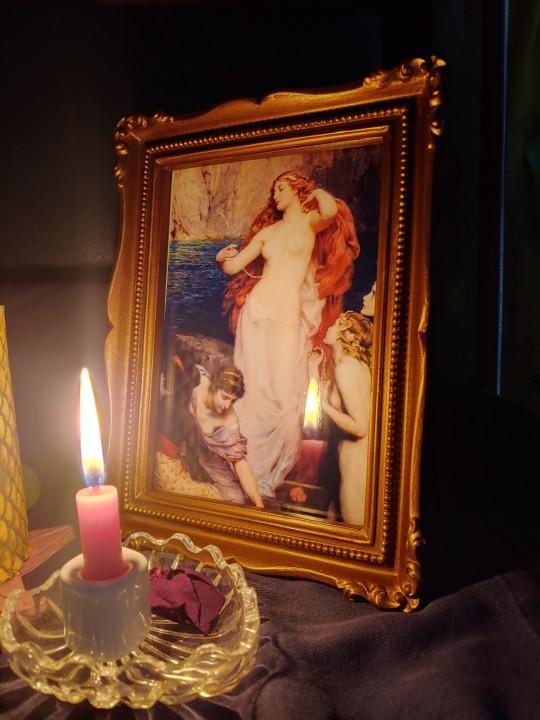
Golden Aphrodite
Lady of beauty and grace,
Please give me the power to appreciate my body
Grant me confidence in my masculinity
Help me to feel your love within myself, and to express it outwardly as well
Lady Aphrodite, please hear my prayer
I sing your praises and offer you this incense
834 notes
·
View notes
Text
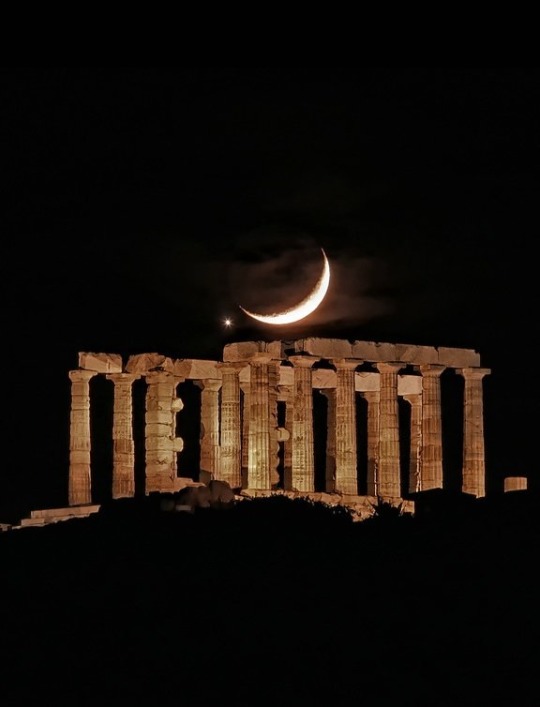
The Temple of Poseidon with a captivating Crescent Moon and Venus, Cape Sounion, Greece
7K notes
·
View notes
Text
I'm just fascinated with how the gods are all by themselves sides of the same coin. Apollo is medicine and plague. Demeter is harvest and famine. Athena is the order of the polis and the uncertainty of war. Dionysus creates chaos only to reinforce order once the party is over. Poseidon is the untameable sea and the liberty that seafaring permits. Artemis is a goddess of the wild yet helps young girls transition into their settled life as adult women.
8K notes
·
View notes








